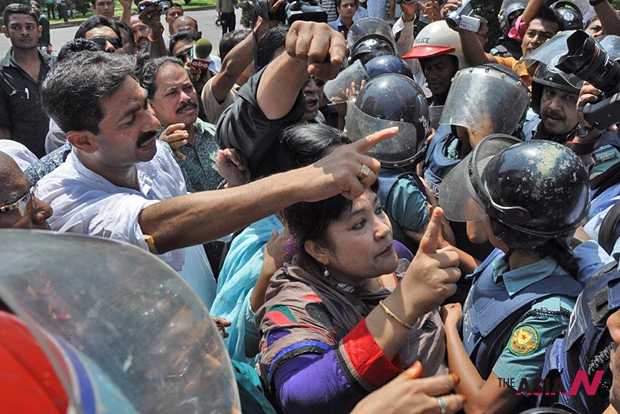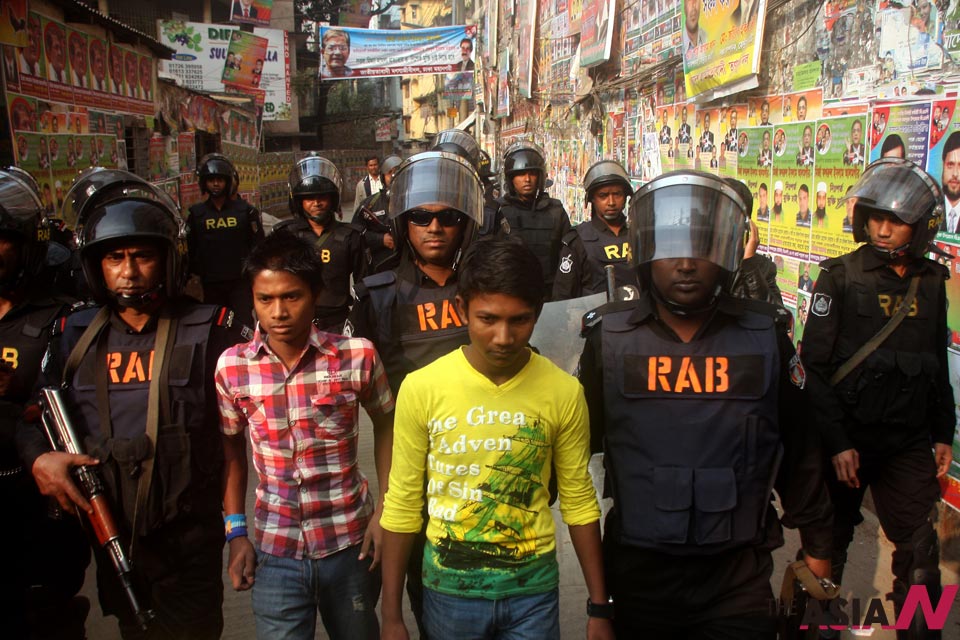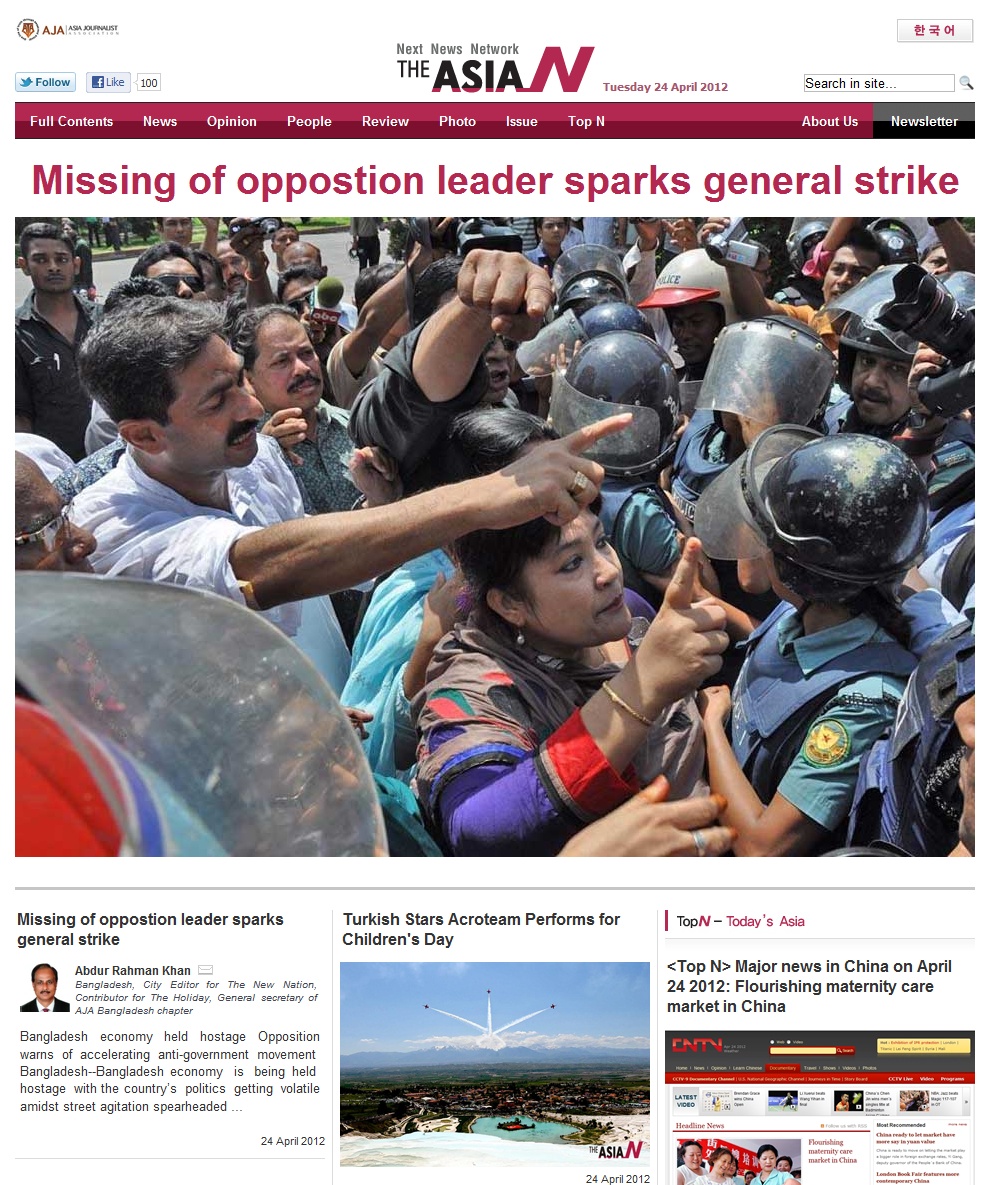
Missing of oppostion leader sparks general strike

Bangladesh economy held hostage
Opposition warns of accelerating anti-government movement
Bangladesh economy is being held hostage with the country’s politics getting volatile amidst street agitation spearheaded against the government by the opposition alliance led by Bangladesh Nationalist Party (BNP).
The opposition alliance enforced two days’ of general strike on Sunday and Monday threatening a continued and accelerated movement until safe return of party’s young leader M Ilias Ali who disappeared on April 17.
Ilias Ali, along with his driver Ansar Ali, remained missing since he left his Banani residence in the capital city of Dhaka in the evening on April 17. On the following day, his abandoned car and mobile telephone set was recovered from capital’s Mohakhali area. His wife immediately lodged a complaint with the police and later filed writ petition before the High Court asking the government to disclose Iliac Ali’s whereabouts and bring him in person.
The opposition is accusing the government of masterminding the disappearance and blamed the law enforces of abducting him illegally.
According to country’s human rights organization, “Ain o salish Kendra” at least 12 persons were victims of disappearance in the country since January this year. In 2011, 70 persons, including opposition political activists went missing and the law enforcers were blamed in most cases for abducting the victims who were later recovered as abandoned dead body.
BNP also alleged that 12,000 party activists and 17 journalists were killed during the three years of rule of Awami League with Sheikh Hasina as the prime Minister.
Under such a frightening situation, the BNP-led 18 party alliance enforced a countywide dawn-to-dusk general strike on Sunday and Monday protesting disappearance of Ilias Ali, a former MP and the organising secretary of BNP.
BNP acting secretary general Mirza Fakhrul Islam Alamgir Mirza Fakhrul blamed the law enforcing agencies as well as the government for the mysterious disappearance of Ilias Ali, who is also the district unit president of Sylhet district.
Mira Fakhrul warned that the ongoing movement would be intensified if the Ilias Ali and his drive are not returned safely.
Mirza Fakhrul said Ilias Ali has been abducted as he had raised his voice against the construction of Tipaimukh Dam by India and played an important role to intensify the ongoing anti-government movement in Sylhet division, the tea-growing region of the country. The government picked up the leader and it has to take all the responsibilities for the disappearance, he added.
Meanwhile, sporadic clashes and arrests marked the countrywide dawn-to-dusk general strike. Several vehicles were also burnt in the Dhaka city during the strike hours.
In the capital, indigenous explosive devices were thrown at the police the law enforcers obstructed processions in different parts of the country. Opposition members of the parliament were also obstructed from bringing out any procession in the Parliament area.
Police and Rapid Action Battalion (RAB) personnel also kept the opposition BNP’s central office in the capital under virtual siege during general strike period.
Almost all modes of vehicles, including buses and private cars, stayed off the streets fearing vandalism. Rickshaws, few CNG-run auto-rickshaws and buses were seen plying the city streets. No long-distance bus left the city since morning. However, train and launch services were normal.
All educational institutions, business establishments, most shops and shopping malls in the city remained closed. But the government offices remained opened as usual.
The opposition-sponsored countrywide shutdown dealt a huge blow to the livelihoods of the poor, who depend on daily earnings to eke out a living for their families.
The prices of almost all the essential commodities have sharply increased in the city because of the hartal, multiplying the sufferings of low and fixed income-group people.
Besides, the office-goers had to face various hassles to reach their workplaces because of shortage of vehicles on the roads during the hartal period.
Economy hit hard

Business activities as well as industrial production across the country came to a halt on Sunday following the countrywide shut-down enforced by the main opposition BNP.
The growing political tension is causing anxiety among the business leaders who fear that it will largely affect business climate of the country.
Expressing concern over the deteriorating political condition, they said such unrest in political arena would cast a dark shadow over the country’s investment climate forcing to hold back their business activities.
During opposition’s general strike programme, capital’s commercial hub, Motijheel wore a deserted look with many banks keeping their shutters down and conducting routine activities inside their offices as the presence of clients was very negligible.
Share trading at the Dhaka Stock Exchange (DSE), the country’s premier bourse, closed lower on the day with prices of most shares declined.
Similarly, the delivery and transportation of cargo from the prime maritime port Chittagong remained suspended during the opposition shut-down.
Business transactions were hampered seriously at the country’s biggest wholesale market in Dhaka and Chittagong as the trucks, lorries and other vehicles were off the roads from 6 am on Sunday.
Production in the garments factories was also hampered seriously as their workers could not reach the workplaces due to lack of transports, according to the Bangladesh Garment Manufacturers and Exporters Association (BGMEA), the apex trade body of garments exporters.
“The trade and industry has already been struggling owing to rising fuel price, high electricity tariff, load-shedding, high lending rates and global economic crisis. Simultaneously, political turmoil couple with recurrent hartals will make the industries more vulnerable as they could hardly run their production in such adverse political environment,” according to BGMEA president Shafiul Islam Mohiuddin,
He said the business community is virtually frightened over the growing political conflict between the government party and main opposition BNP and the community was more alarmed by the possible adverse impact on the economic activities.
“Bangladesh economy could not survive under such staggering political stress,” said Mohiuddin, adding that business community never supports such type of destructive political programme.
The BGMEA leader wished for an early settlement of issues on the political scene to allow the economy to go for the natural growth tract.
“Both the government and opposition party should act together to clear the ongoing political upheaval so that business and industry can flourish freely,” he suggested.
“The main opposition BNP on Monday called another dawn-to-dusk general strike for the third consecutive day tomorrow (Tuesday).
The party called the strike demanding the return of its missing organising secretary M Ilias Ali and in protest against the killing of two BNP activists in Sylhet, police attack and arrest of BNP leaders and activists across the country during the hartal hours.
BNP acting secretary general Mirza Fakhrul Islam Alamgir announced the hartal programme at a press briefing at the party central office at 5pm on Monday.
Meanwhile, The angry mob in Biswanath, the home constituency of Ilias Ali, two persons were killed and 30 others were injured when the anti-government mob clashed with police and the ruling party cadres. Over 750 persons were injured, nearly 400 were arrested throughout the country during hartal hours on Monday.” где получить деньги по паспорту






One thought on “Missing of oppostion leader sparks general strike”
Excellent post. I was checking continuously this blog and I am impressed! Extremely useful information specially the last part 🙂 I care for such info a lot. I was looking for this certain information for a very long time. Thank you and good luck.